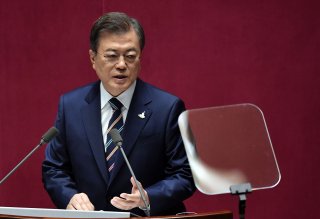New Coronavirus Spike at Churches Causes Heightening of Restrictions in Seoul
Korea's management of the crisis has been seen in sharp contrast to America's own approach.
Over the three-day National Liberation Day weekend of August 15-17, conservative protesters gathered en mass at an illegal rally in Gwanghwamun Square, civic organizations held seminars, and students took advantage of the extra free time to crowd bars and cafes in Hongdae, Sinchon, and Gangnam, Seoul’s hopping leisure districts.
The number of new daily coronavirus cases spiked to its highest point since March 8. From August 14 until August 17, every day there has been over one hundred new cases, making a total of 745.
These are big numbers by Korean standards. Not since July 25 has there been triple-digit cases in a single day, and not since March have there been for multiple days in a row. And yet there are countries in the Americas and Europe that would celebrate such numbers.
Most recently, 279 new cases were confirmed on August 16 in a population of 51.6 million. The population equivalent in the United States would be 1,773 new daily cases or twenty-eight times fewer than America’s seven-day average. Spain’s outbreak, which began in July, has gradually increased from 300 a day to 6,000. Even countries that had reached levels of relative stability, like the UK, France, and Germany, had stabilized at levels well above 300 a day.
But while American school districts continue to try to open in-person classes (before closing them a week later), Korea has already closed churches (where the outbreak started), moved school online, closed sporting events to fans, and raised the Seoul Capital Area to level two restrictions. Officials argue it is better to stop the spread at a relatively low level than to wait until it gets uncontrollable.
However, the new measures are annoying to some.
One student who is entering graduate school at Yonsei University, who worries about the possibility of disruptions, said, “It is best to have the classes on campus if the transmission prevention procedures are being performed. Nonetheless, regarding the government policies, schools must not violate the directions. Still, if another online semester is necessary, I suppose the students deserve discounted tuitions as online schooling is not 100 percent equivalent to original offline courses.”
However, the measures in Korea are being done on a short-term time frame so that progress can be evaluated. Elementary schools, for example, are moving online for two weeks. If the increase in cases can be arrested, then schools and sporting events and other activities can resume in person.
Most of the new cases have originated at churches. With Korea’s robust testing system—and a small enough number of cases that tracing is manageable—the origins of the vast majority of cases have been tracked. The Sarang Jeil Church in north-central Seoul has been associated with 319 cases of over 700, and 122 members of the Woori Jeil Church in neighboring Gyeonggi province have been infected. Some of those infections have spread further to call centers, child care centers, and nursing homes across the country, Korean CDC head Jeong Eun-kyeong said.
The Sarang Jeil Church’s pastor Jun Kwang-hoon, a conservative activist, was among those infected. Jun was also one of the organizers of the anti-Moon protests on National Liberation Day and encouraged his congregants to attend, even though the government had issued a ban on the large-scale protest. Arirang News reported that 4,000 people attended the conservative protest, while an additional 2,000 attended a protest organized by labor unions nearby. Yonhap put the total at over 10,000.
President Moon Jae-in criticized Jun’s actions, saying, “It is a very senseless act that hampers efforts of the whole people to contain the spread of the new coronavirus.”
Jun, who led protests against scandal-plagued former Moon official Cho Kuk last year, was arraigned in February on charges of illegal electioneering.
Emergency messages went out to the cell phones of people in the Seoul area, demanding that anyone who attended the protests or attended the Sarang Jeil Church must immediately report to a health center to receive a diagnostic test. Health Minister Park Neung-hoo says that all 4,000 members are being tested.
On Tuesday afternoon, August 18, the decision was announced to close all churches in Seoul, Incheon, and Gyeonggi for the next two weeks. Only contactless worship services are allowed.
Korea has overcome their second wave already, the infamous Itaewon club outbreak of May. Seoul bars shut down and school re-openings were delayed. By late July, life in Seoul seemed almost indistinguishable, save for the masks, from its usual hustle and bustle.
Now there may be a period of greater restrictions. The CDC is putting out grave warnings. Some people are deciding to stay inside. As I finish typing this, the operator of the cafe I am writing from in Incheon is spraying disinfectant in the air and on the door handle.
Mitchell Blatt is a former editorial assistant at the National Interest, Chinese-English translator, and lead author of Panda Guides Hong Kong. He has been published in USA Today, The Daily Beast, The Korea Times, Silkwinds magazine, and Areo Magazine, among other outlets. Follow him on Facebook at @MitchBlattWriter.
Image: Reuters

